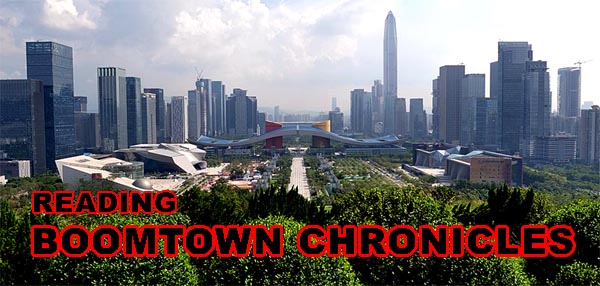 |
| Shenzhen, the Boomtown (Wikipedia) |
Note: Between Lesson #01-128 and #01-207, I wrote 72 lessons explaining expressions in articles published in the Shenzhen Daily. Read more about "Reading Boomtown Chronicles."
Get Ready: Have you ever had a windfall? Where did it come from?
Boomtown Chronicles Part XIII - published Monday, September 8, 2008 (cont.)
- Deng Zhibiao was the "mastermind" of Yumin Village's success.
mastermind: planner; originator> It can also refer to someone especially smart or skillful, but it can also sometimes be used of criminals: "The crime boss was the masterminded behind the robbery." Here it is alluding to Deng Zhibiao's brilliance as a village head,
- Hong Kong businesspeople chose to invest in "virgin land."
virgin: unused; untouched. Just as a virgin is a woman who has never been with a man, so virgin land has never been used or developed. Some find this word to be somewhat sexist (discriminatory) and prefer to use words like "frontier" or simply "undeveloped land."
- Yumin Village received a "windfall" in the form of investments from Hong Kong.
windfall: an unexpected receipt of money or other benefit for which the recipient hasn't really worked. It originally referred to fruit that fell from a tree without picking, or firewood that fell without chopping--as when it was blown down by the wind.
- The villagers had been "pooling" money to raise living expenses.
pool: a verb meaning to place something in a common fund. That fund can then be called a "pool"; water pools to form a pool; when people pool together to ride to work, it's a carpool; and so on. This just means that the people put their money together to increase their buying power.
- The village bought two "cargo ships."
cargo: goods carried in a ship, plane, truck, etc. It's a commonly used word, but few realize its interesting history. It comes from the Spanish word cargar meaning "to load" or "to burden." The Spanish word, in turn, comes from the Latin carricare with the same meaning. A more common derivative of the same Latin root is "charge." When we "charge" a battery, we are loading it with power.
Every use of the word "charge" comes from the same origin. Hence, when one army charges another, it is burdening that army. When a restaurant imposes a service charge, they are burdening you more than if they just charged you for food. When the police charge someone with a crime, they are giving him a heavy load to bear. When someone is "in charge" of a project, they have quite a load to carry.
--------
Read more: https://en.wikipedia.org/wiki/Shenzhen
Practice: Choose the correct term to fill in the blank in the sentence below:
- cargo
- mastermind
- pool
- virgin
- windfall
- Let's ________ our allowances and build a skateboard park!
- Using recycled pulp instead of ________ pulp to make paper helps to save our forests.
- In the old days, horses, camels, and other animals were used to carry ________.
- The government subsidy check was a ________ that helped millions of families.
- The badminton coach was the ________ behind the team's success at the tournament.
Answers are in the first comment below.
Submitted to the Shenzhen Daily for September 16, 2008


Answers to the Practice: 1. c; 2. e; 3. a; 4. b; 5. d
ReplyDelete